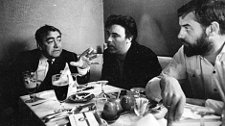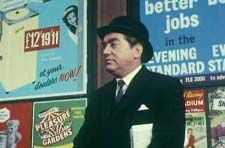
Tony Hancock would have played a London bus driver in pursuit of happiness, purpose, and of course, sex, all in his day off.
Its not often that an unmade film can get revived and given a world premiere, least of all when its script was abandoned 50 years ago. But that is in a sense what has happened this year with The Day Off - a unfilmed script written by Steptoe And Son creator team Ray Galton and Alan Simpson, and premiered at this years London Comedy Film Festival via a live cast reading to an audience. Written with the intention of starring comedy legend Tony Hancock in 1961 (Galton and Simpson having worked with him before on the film The Rebel in 1961, and earlier in radio and TV), the script was ultimately rejected by Hancock, and it sat in a drawer gathering dust... until now.
Given the high regard in which Galton and Simpsons are held, a cast of top comedy talent including Kevin Eldon, Susy Kane, Morwenna Banks, Tom Goodman-Hill, Emma Kennedy, Norman Lovett, Alexander Kirk and Sara Pascoe were more than willing to take on the various roles in the script for a live performance at the BFI Southbank.
Following the well-received reading, Galton and Simpson effortlessly entertained the audience from a giant treasure chest of comedy anecdotes, and gave some insight into why this script never made the jump onto celluloid despite the writing duo and Hancock being at the peak of their powers in 1961. They revealed that they were never actually paid for writing the script, so it was with some satisfaction that they were at least able to watch it be performed.
The Day Off's plot itself reflects Galton and Simpson's focus on working class struggles, thwarted ambitions, tragic farce, and the gap between character's ambitions and the sad reality of the glass ceiling they hit. They would go on to successfully layer these themes into eight seasons of Steptoe And Son on TV. As Simpson observed to the audience: “Success is not funny, failure is. It is not funny to see people win.” Had The Day Off been filmed, Hancock would have played a London bus driver on his day off. With just one day of freedom, he sets out to find happiness, purpose, and of course, sex. When he meets a bright young woman - Charlotte - randomly at a cafe, it seems that he may have found all three. But a simple lie told out of pride leads to it all unravelling.

Following their work with Hancock on The Rebel, which saw him nominated for a BAFTA for Most Promising Newcomer, it seemed likely the three working together could repeat their success. Thus Galton and Simpson set out to write the perfect comedy vehicle for the screen, but the only idea Hancock responded to out of several was The Day Off. It took them six weeks to write the script and get it delivered to Hancock. “We saw it as our answer to Jaques Tati's Monsieur Hulot's Holiday”, Simpson remembered. But though he was pleased when they dropped the script off, nothing more was heard.
“I assumed he thought it was too parochial”, Simpson surmised when asked why Hancock rejected the script. Hearing nothing back from Hancock after delivering a script was usually a bad sign, and the script had come about at a time when Hancock was yearning for an international career. Perhaps starring in another very English, small scale comedy just felt too limiting for him.
Galton and Simpson noted the irony however that Hancock went on to film The Punch And Judy Man after rejecting their script - an English film if ever there was one. At the same time, Hancock also fired his agent, their friend Beryl Vertue, a way perhaps of further telling them he didn't want to work with Galton and Simpson any more. And they never did - The Day Off was the last script they completed specifically for Hancock, and it sat in a drawer in Galton's basement gathering dust for 50 years until unearthed during research for a book.
"We thought it would never see the light of day,” Galton admitted. But though they never worked with Hancock again and he would go on to a tragic decline, there was at least a silver lining to the tale - had The Day Off been filmed, the duo mused that they might never have gone on to write the hugely successful and influential Steptoe And Son.





















